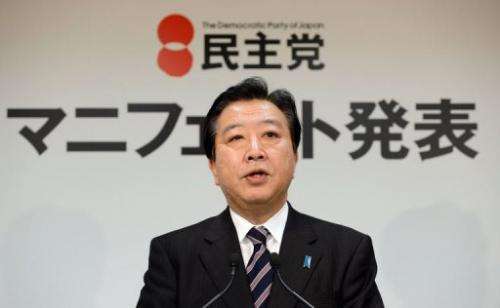Japan's ruling party promises to phase out nuclear power

Japan's Prime Minister Yoshihiko Noda promised Tuesday to rid Japan of nuclear energy in coming decades as he set out his party's platform before next month's general election.
Noda also pledged to conduct "calm and realistic" diplomatic and defence policies, as he tried to counter claims by his opponents that his Democratic Party of Japan does not stand up to foreign powers.
"After the nuclear accident (in Fukushima), we believe the Japanese people wish for and are resolved to have a society that does not rely on nuclear power plants," Noda told reporters.
"We will put all available policy resources into building a path toward that goal," he said.
The pledge amounted to a slight hardening of announcements made earlier this year when his cabinet said it would work towards scrapping nuclear power by the end of the 2030s.
A vocal section of Japan's public has turned against atomic power in the aftermath of the disaster at Fukushima, where reactors were sent into meltdown after cooling systems were knocked out by a tsunami.
However, many in the business community say Japan needs nuclear to power its industries.
In a document that was short on specifics, the DPJ said it would also try to end deflation during fiscal 2014 by working with the Bank of Japan and promised a "large-scale" extra budget in early 2013.
It reiterated a desire to deepen Japan's alliance with the US, and promised to "promote" Japan's involvement in talks on the Trans-Pacific Partnership, a wide-ranging free trade agreement that is anathema to the country's cosseted farmers.
The manifesto stands in sharp contrast with the party's 2009 campaign platform that offered a number of specific promises, many of which it failed to deliver on.
In 2009 the DPJ promised to build equal ties with the United States, to scrap highway fees and to stop the construction of a huge dam, among other pledges.
The party failed to make good on many of them and is expected to suffer as voters desert it in favour of the main opposition Liberal Democratic Party or smaller, newly-formed groupings.
"Looking back at the past three years, there are promises that we were able to keep, and unfortunately there are things we could not deliver," Noda said.
"With deep apologies to the Japanese people, and lessons learned from our shortcomings, we drafted this," he said.
The LDP unveiled its campaign promises last week, saying it would strengthen defence programmes and consider establishing a permanent presence on uninhabited Tokyo-controlled islands at the centre of a dispute with China.
Japan goes to the polls on December 16, with most commentators expecting no party to gain overall control of the powerful lower house. A possibly shaky coalition government is seen as the likeliest outcome.
(c) 2012 AFP





















